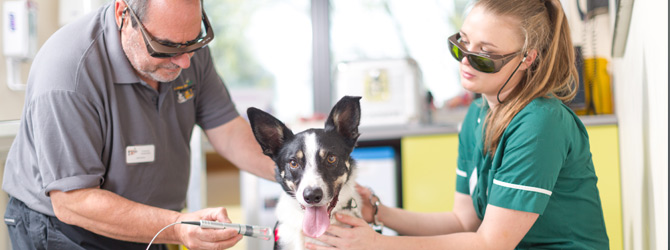Laser therapy for dogs: what is it and which conditions can it treat?
Laser therapy is commonly used in human medicine, but did you know it can be used for dogs too?
In fact over the past decade, laser therapy has been used to treat a myriad of health problems in dogs, and very effectively too.
Let’s take a closer look at laser therapy for dogs, how the process works and which conditions the process can treat.
Definition: laser therapy in a nutshell
Laser therapy, also known as photobiomodulation, refers to the process of using light energy to target areas of the dog’s body at cellular level. The light source is non-thermal, meaning that it doesn’t generate any heat; when it is exposed to the relevant body part, it essentially causes the cells that are needed for recovery – or other forms of healing – to grow or work faster than normal.
Laser therapy is an effective, non-invasive treatment that ultimately aids the body to repair itself.
How it works
When a dog comes into a practice for laser treatment, the vet or veterinary nurse will apply the treatment using a handheld device. The process is quick, especially once the dog gets used to it, and does not cause the animal any pain. Depending on how severe the dog’s condition is, they will return on a weekly basis for repeated treatments.
Your vet might recommend laser therapy in conjunction with other treatments such as acupuncture, massage and hydrotherapy.
Read more: Hydrotherapy for dogs
Which conditions can laser therapy treat?
Laser therapy is most commonly used to treat pain, musculoskeletal problems and wounds. By increasing the growth of healing cells, it can aid recovery from conditions like:
Dogs will likely benefit from laser therapy more as they get older and become more prone to conditions like arthritis or other joint/muscle issues.
Risks: are there any dangers of laser therapy?
As laser therapy is designed to encourage cellular growth, it should not be used in cases where it could increase the growth of harmful cells, such as on tumours or other cellular mutations. Likewise, laser therapy should not be used to treat pregnant bitches.
Although most lasers don’t generate heat, some powerful (Class 4) lasers can be known to do so. If you have concerns about the type of laser your vet or veterinary nurse is using, we advise chatting with them when or before arranging the procedure.
The vet or veterinary nurse, pet and owner must wear protective goggles during a laser therapy session; if not, their eyesight can be put at severe risk.
Need more info?
If you have further concerns or queries about laser therapy or you simply wish to find out how it could benefit your dog, have a chat with your vet. They’ll be able to tailor their advice to your specific pet, their breed and the condition they’d be treating.
Find your nearest vet using our Find a Vet page, or speak to a vet online using Online Vets.

